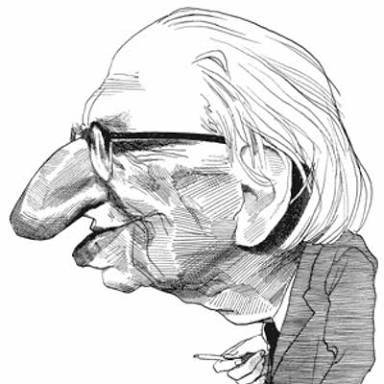FORM
“The true bearers of ideology in art are the very forms,
rather than abstractable content, of the work itself.”
(Georg Lukács)
As one of the oldest forms of art, poetry is a way of reacting to the world. It is a vision, a statement of position that can sometimes become very political. But sometimes it can also be a boring activity, an activity that feels 'in vain'. This thought of poetry arises mainly after reading the poems that have recently appeared in various media, which in turn raises a question: does a poet ever feel bored and then even berate his own poems?
This question flashed in my mind when I felt that the recent poems--the poems of the 1980s and 1990s to the present--are just repeating what has been written by previous poets, which can be said as "established" poets. I feel that the recent poems have been trapped in a routine of form and style of expression of the "established" poets. And the routine, in addition to causing a sense of boredom, also raises what in Javanese is called ampang (a feeling of hollow and bland because something is too ordinary). There were no more creative experiments--just as had done by the 1970s poets—which was full of the unexpected. There is no "noise" that sometimes makes us stunned. It feels that most of the poems of the 1980s and 1990s have been caught up in what Goenawan Mohamad (GM) called as the literary machiavellism [2] -- in this case poetry.
A machiavellist, so GM, in its smaller form is an author who puts his absolute value on the theme (content/message) of his work. For me, this category of machiavellist can also be applied to poets who only adopt poetical forms that have been expressed by their predecessor poets in the literary tradition. These machiavelists, without attempts or trials to find a form for the theme (content / message) to be conveyed, view the theme as the ultimate goal and the only thing in which all of his work is at stake. This situation will certainly give the impression that what feels in their works or poems is not the process of creation, but only the process of adoption. This condition most possibly will lead to stagnation in the tradition of poetry.
The stagnation of the field of poetry that takes place in Indonesia today, as has been more or less mentioned above, is due to the recent poets less courageous to do explorations and experiments in their form and style of poetry expression. With the form and style of expression that is relatively no different from one poem to another, between one poet and another, it can be worried will soon be abandoned. Because by simply relying on a theme (content/message), someone may find it elsewhere: in the places of worship, the holy books, the politicians' “moral” sermons, or the social messages of the state officials.
Indeed, perhaps this literary machiavellism is still acceptable when the view of poetry is still as expressed by John F. Kennedy as he reads Longfellow and John Greenleaf Whittier, or Soe Hok Gie's view when reading Walt Whitman and Chairil Anwar: in their view poetry can be a place of purification for political corruption; or, in other words, become a "soul filler" from a “soul expert”.
But the position of poetry becomes different when the view of poetry has also become different. The position of poetry becomes different when poetry is no longer considered as something mysterious, and is considered the same as other texts. The position of poetry became different when Stalin's remark that "the author (or poet) is the engineer of the human soul" is untenable.
Here it does not mean that we have to look down on the theme (content/message) and too adore the form like the adherents of L'art pour l'art dictum or the Russian Formalists. It's just that to focus too much on the theme (content/message) will only make the poetry just like the moral messages, religious sermons, or social cries as mentioned above. In fact, borrowing the expression of Lascelles Abecombrie, the thought that the function of literature (read: poetry) is to teach humans to be more moral means already stepped out of the literature field itself. Overly focused on the theme (content/message) – with the excuse of looking for "depth", for example – will only make poetry as a means of conveying a message and not valued in itself.
From what is expressed above, it does not mean that we should look at the form and theme (content/message) as two things that can be clearly separated like red wine and a glass. However, for the poets who has found their own form of pronunciation -- the poets who really engage and feel the process of creation and exploration of the possibilities of poetic expressions -- the distance between the form and the theme (content/message) is felt. Terry Eagleton stated that "if form and content are inseparable in practice, they are theoretically distinct" (Terry Eagleton, 1984, p. 24). Rejecting the distance between form and theme, indirectly means rejecting the possibilities of poetic expressions.
The impasse that arises from this "similarity" of form and style of expressions can be seen at least in the following phenomenon: the 1980s and early 1990s in Indonesian poetry can be said as a period in which many names of poets were born. This period shows how the climate of poetry writing reached the most fertile point. Yet, oddly enough, among the many names of new poets, there is hardly any work that has a wide and lasting echo. Indeed, in those decades there has also been a renewal. But the renewal that took place has more emphasis on the theme: in the decades there were a strong tendency to uphold the Sufism themes and make (local) tradition as a source of creative inspiration. Danarto called this trend a "back to the source" movement, while Sutardji Calzoum Bachri called it as a "return to the roots of tradition" movement. Unfortunately, the renewals in the theme were not “wrapped” in the renewals of form and style of poetic expression.
The phenomenon above is very different from what happened in the decade of 1970s in Indonesia. In this decade the Indonesian poetry was so boisterous with the various forms and styles of poetic expressions that were offered: there were Sapardi Djoko Damono with his imaginary poetry; Remy Sylado with his 'mbeling' (naughty) poems that tries to dismantle poetry as something that was considered serious and sublime; Goenawan Mohammad with his 'moods' poetry and 'intellectual' poetry; and so forth. In this decade, where the names of poets that appeared were not as much as it did in the 1980s and 1990s, there was also a very important renewal which later became one of the milestones or most important genres in the Indonesian poetry: Sutardji Calzoum Bachri with his 'mantra' poems. Perhaps in terms of themes, Sutardji’s “mantra” poems (collected in O, Amuk, Kapak) are relatively not different from the themes of other poets poems (themes of love, deity, humanity, friendship, vanity, etc). But from the 'usual' themes Sutardji’s poems can casted a very broad and long-lasting echo. And the echo, as we can see, comes more because of the new forms and styles of his poems -- including the metaphors and symbols, etc., they used -- that fit with the poetry “credo” written in the book.
From this we can see that the strength of a poem depends not only on the 'universal', 'sacred' and 'burdensome' theme, but also (and especially) on its distinctive, 'new', and unique forms and styles of expression. Indeed, borrowing Hegel's phrase in the Philosophy of Fine Art, "every content brings out a form that suits itself."[3] This does not mean, however, without the search and experiment of new forms and styles of poetic expression. Because, as quoted at the beginning of this essay, “the true bearers of ideeology in art are the very forms, rather than abstractable content, of the work itself.”
References:
Terry Eagleton, Marxism and Literary Criticism, London: Routledge, 2002, p. 23.
Goenawan Mohamad, Literature and Power, Jakarta: Pustaka Firdaus, 1993, p. 83-85.
Terry Eagleton, Marxism and Literary Criticism, London: Routledge, 2002, p. 20.
(Original essay -- © Zaim Rofiqi)
With Love ... ☕❤
ZR '18
===================


.jpg)
When always you want to make a difference, also the uniqueness of any art is what makes it special. The fact that content and message are undifferentiated things, that's true. Thanks a lot for the good article @zaimrofiqi
You are welcome, @bmotives
Glad you enjoy it...
Yes I enjoyed @zaimrofiqi
@zaimrofiqi upvoted this post via @poetsunit!!

Poetsunited - DISCORD - @poetsunited - witness upvote
Bacaan yang sangat menarik. Salam
Posted using Partiko Android
Terimakasih, kawan...
Postingan yang sangat bagus.
Posted using Partiko Android
Terimakasih...
I am re-reading this essay. I wondered where you have gone to - something may be keeping you busy? In any event, let us chat when you get back to steemit or discord, insh'allah.
Thank you, bro... I am back now...hehee... Hope you always in healthy & prosperous conditions...